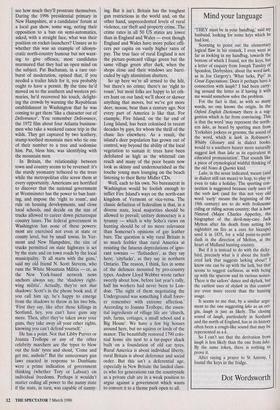Mind your language
`THEY must be in your handbag,' said my husband, looking for some keys which he had lost.
Scorning to point out the elementary logical flaw in his remark, I even went as far as looking in my handbag, towards the bottom of which I found, not the keys, but a letter of enquiry from Joseph Tansley of Spondon, Derbyshire, about the word lark, as in Joe Gargery's 'What larks, Pip!' in Great Expectations. Does it perhaps have a connection with laugh? I had been carry- ing around the letter as if having it with me would somehow solve the problem.
For the fact is that, as with so many words, no one knows the origin. In the Oxford English Dictionary there is a sug- gestion which is far from convincing. This is that the word 'may represent the north- ern lake, as heard by sporting men from Yorkshire jockeys or grooms; the sound of the word, which is lairk in Robinson's Whitby Glossary and in dialect books, would to a southern hearer more naturally suggest lark than lake as its equivalent in educated pronunciation'. That sounds like a piece of etymological wishful thinking of the old Notes & Queries kind.
Lake, in the sense indicated, meant (and in dialect still can mean) to leap, to play or even to take a holiday. The sporting con- nection is suggested because early uses of the verb lark (and for this not very old word 'early' means the beginning of the 19th century) are to do with frolicsome riding or riding across country; that is how Nimrod (Major Charles Apperley, the biographer of the devil-may-care Jack Mytton after his death from setting his nightshirt on fire as a cure for hiccups) used it in 1835, for a wild point-to-point dash in the direction of Melton, at the heart of Midland hunting country.
But if it is instead to do with the dicky- bird, precisely what is it about the feath- ered lark that suggests larking about? I know one can be up with the lark, but that seems to suggest earliness, as with being up with the sparrow and its various noises. There is the sailors' dance and skylark, but the earliest uses of skylark in this context are even more recent than the hunting usage.
It seems to me that, by a similar argu- ment to the one suggesting lake as an ori- gin, laugh is just as likely. The closing sound of laugh, particularly in Scotland and the north of England, has in its history often been a cough-like sound that may be represented as a k.
So I can't see that the derivation from laugh is less likely than the one from lake. By the same token, there is nothing to prove it. After saying a prayer to St Antony, I found the keys in the fridge.
Dot Wordsworth


























































 Previous page
Previous page